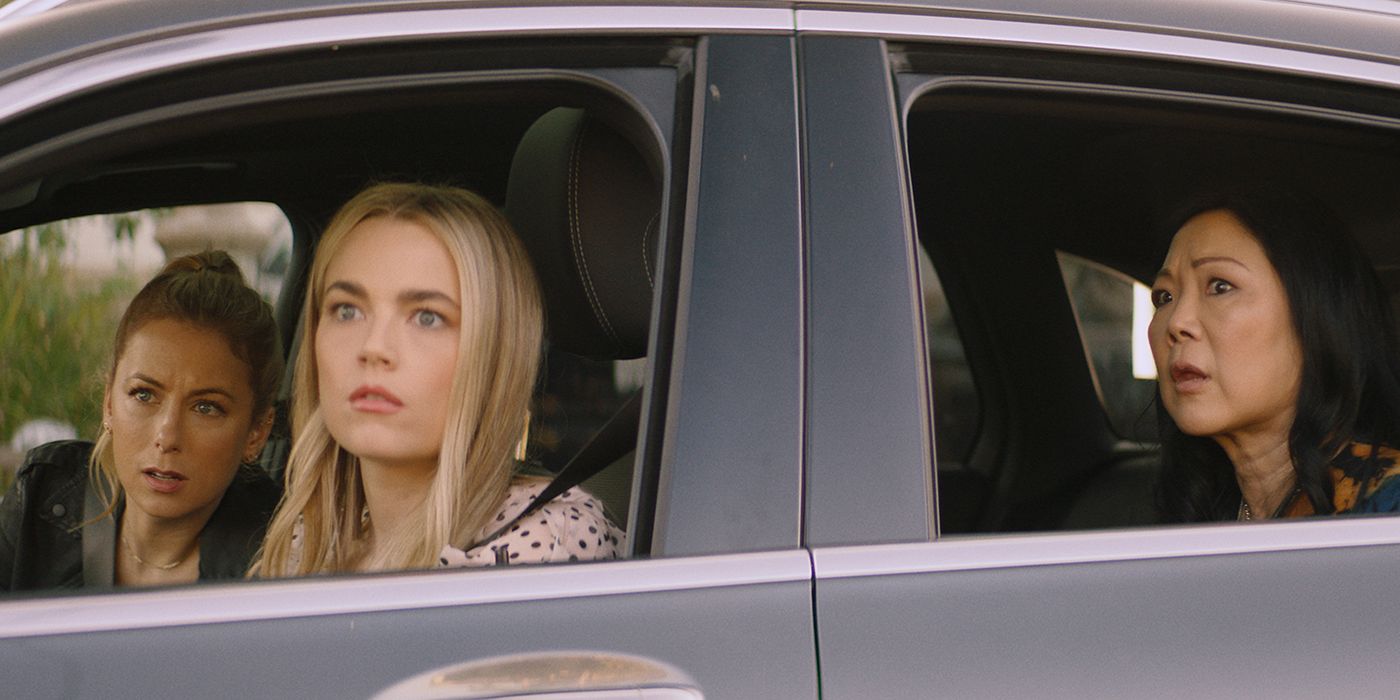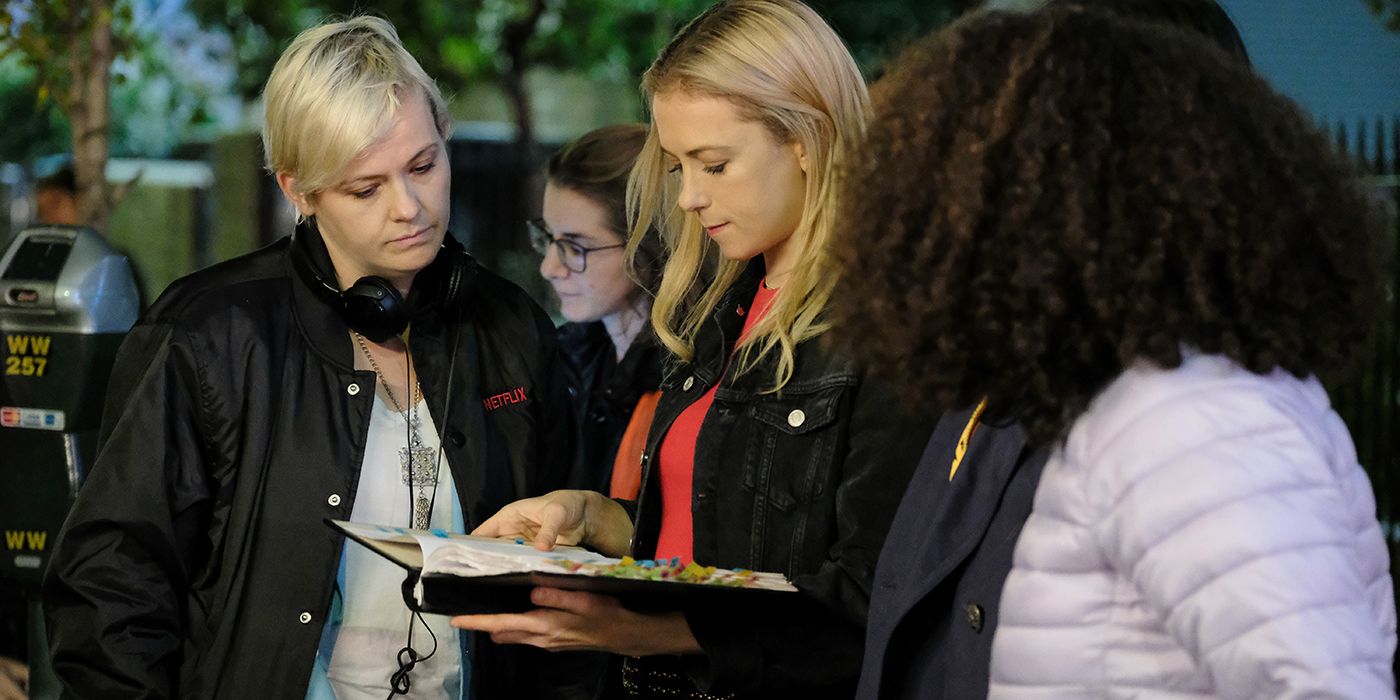Good On Paper, arriving June 23 on Netflix, starts as a romantic comedy but quickly reveals layers beneath the surface. Based on a mostly true story from her own life, the film stars writer and stand-up comedian Iliza Shlesinger (Spenser Confidential).
Shlesinger skillfully fictionalizes her story, centering on up-and-coming actress Andrea's progressively unsettling relationship with the seemingly perfect-for-her Dennis (Ryan Hansen, Fantasy Island). When he turns out to be hiding more than a little, it's up to Andrea and her friends to find out what is bubbling under the surface.
The actress and spoke to Screen Rant about the process of writing her first feature film script, and the importance of the female dynamics explored in the story.
How different is it for you to take your real experience, which you could often talk about on stage for comedy shows, and fictionalize it for a film narrative?
Iliza Shlesinger: This was a labor of love. This was taking something that really stopped me in my tracks that happened, that was painful, and turning it into art. So, it took a while.
And this was something that I worked on very quietly between failed auditions, between flights after gigs; it was really more about me processing something. But it actually just poured out of me, and it actually was a lot easier once we brought other people on board to give life to those characters that I'd spent so much time staring at.
It was difficult to get it made, because movies are hard to get made. But the actual creating of it was nothing but cathartic.
What I especially love is that it's almost like an anti-romcom. Not only is it not romantic, but the real relationships are between Andrea and different women, like Margot and even Serrena, who's not villainized the way that I would expect it. How important and purposeful was it for you to really dive into that?
Iliza Shlesinger: I'm glad that you keyed in on that, because it was extremely purposeful, and it's very important. This movie is not about a hapless romantic, who just fumbles through life and is like a dumpster fire. This is a girl who paid her way through life, and who worked hard with living life on her own terms.
And the lesson she learned wasn't one to be doled out by this man. He's not there to teach her anything, because he needs to learn so much himself. This was about her arc, so I wanted it very much to be personal, and about the anger that she had toward this other girl. It was about that strength with her best friend, because that's how my best friend and I are.
At the end of the day, it really is like a self-discovery female friendship movie. I would never give Dennis Kelly that much power in a narrative; that he changed her. Gross.

I love that undercurrent of women in the industry not having the creative control that they deserve, especially in the opening with Andrea fixing the writer's joke. Could you talk a little bit about your experience and what led to including that element onscreen?
Iliza Shlesinger: Sure. Of course, I wanted to thumb my nose a little bit at how arduous an audition process can be - though I've had great auditions too. Sometimes you get in there, you read something and you're like, "Who wrote this? Why am I reading for this?" It's all so frustrating, especially when you don't book the things that you want to book.
It's this narrative that's shoved down women's throats, of like, "You're your only competition. You can't say that you ever see another woman coming." We're all supposed to be peace, love and light. And while that is the ultimate goal, and Andrea does arrive at that, we're lying when we don't honestly say, "Yeah, I can't stand that girl. Of course, I've seen her as the enemy." Even though that's not the reality. This isn't about the reality; this is about the perception that we all have, and how no one's allowed to admit it.
I make my living off saying the thing that we all think we're not allowed to say. You've got to keep it honest.

This is your first time writing a full-length feature film and Kimmy's first time directing one. What was that collaboration like?
Iliza Shlesinger: Kimmy got this gig - because, of course, we're all feminist here. But a real feminist wants the best person, the most qualified person, to get that gig. And in this case, it was Kimmy. She was the most prepared, and vibrationally understood me the most.
And - this was important - she came with ideas, but they were narrative ideas and structural ideas. These weren't reshaping it or changing Andrea; she was very respectful of the tone that I wanted to keep intact, and the integrity of certain characters and choices. I found it very comforting, and I love collaborating when I trust someone, and can trust that I can say, "Good idea, bad idea."
We changed around a couple of things, and she added in a couple of beats that I thought really enhanced it. I really enjoyed that when working with her.
Finally, I love Margot's apocalypse survival kit. What would you have in yours?
Iliza Shlesinger: Oh, boy. Well, I guess you've got to have hard Kombucha. You've gotta have Sour Patch Kids. Do I have internet access? Maybe a couple seasons of Frasier loaded up on the laptop. I guess it won't matter if we're thin in an apocalypse, so Pringles, and maybe some chicken nuggets.
Good On Paper arrives June 23 on Netflix.
from ScreenRant - Feed https://ift.tt/3gYGzF8

0 Comments